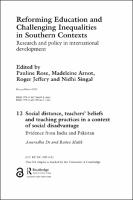Chapter 12 Social distance, teachers’ beliefs and teaching practices in a context of social disadvantage
Proposal review
Evidence from India and Pakistan
Abstract
"This chapter analyses the widening inequalities within the government primary schooling systems in India and Pakistan and the implications of the emerging social distance between teachers and students. Social distance is a significant factor impacting student–teacher interaction in classrooms. How, and to what extent, does social distance shape teachers’ beliefs and practices? What is the likely effect of social distance on the education or learning of children from disadvantaged backgrounds? Using teacher interviews and classroom observation data, the chapter describes teachers’ beliefs and observed teacher–student interaction for high- and low-performing children. The empirical analysis is grounded in a conceptual frame linking teachers’ beliefs, practices and learning outcomes.
Most teachers included in the study believe family background is the most significant determinant of learning. Teachers’ conceptualisation of a good student comprises a set of characteristics that are much more likely to be present in children from families where parents are educated and in stable economic circumstances or naturally gifted children. Teachers tend to favour the good students and can rarely adapt practice to help remove disadvantages for low-performing children or those from marginalized backgrounds. As a result, government schools are sites for the social reproduction of inequalities."


 Download
Download